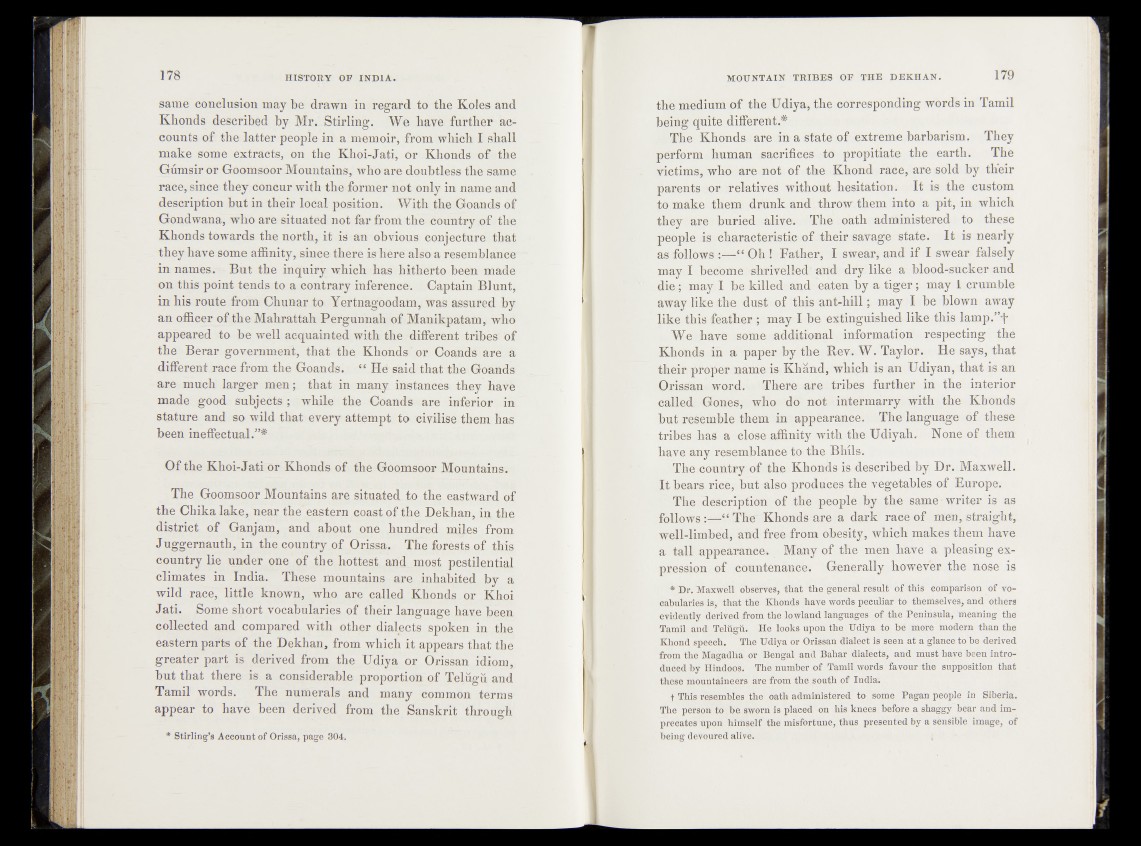
same conclusion may be drawn in regard to the Koles and
Khonds described by Mr,-. Stirling. We have further accounts
of the latter people in a: memoir, from which I shall
make some extracts, on the Khoi-Jati, or Khonds of the
Gfimsir or Goomsoor Mountains, who are doubtless the same
race, since they concur with the former not only in name and
description but in their local position. With the Goands of
Gondwana, who are situated not far from the country of the
Khonds towards the north, it is an obvious conjecture that
"they have some affinity, since there is here also a resemblance
in names. But the inquiry which has hitherto been made
on this point tends to a contrary inference. Captain Blunt,
in his route from Chunar to Yertnagoodarn, was assured by
an officer of the Mahrattah Pergunnah of Manikpatam, who
appeared to be well acquainted with the different tribes’ of
the Berar government, that the Khonds or Coands are a
different race from the Goands. “ He said that the Goands
are much larger men; that in many instances; they have
made good subjects; while the Coands are inferior in-
stature and so wild that every attempt to civilise them has
been ineffectual.”*
Of the Khoi-Jati or Khonds of the Goomsoor Mountains.
The Goomsoor Mountains are situated, to the, eastward, of
the Chika lake, near the* eastern coast of the Dekhan, in the
district of Ganjam, and about one hundred mij^s from
Juggernauth, in the country of Orissa. The forests of this
country lie under one of the hottest and most pestilential
climates in India. These mountains are inhabited by a
wild race, little known, who. are called Khonds or Khoi
Jati. Some short vocabularies of their language have been
collected and compared with other dialects spoken in the
eastern parts of dhe Dekhan, from which it appears that the
greater part is derived from the Udiya or Orissan idiom,
but that there is a considerable proportion of Telugu and
Tamil words. The numerals and many common terms
appear to have been derived from the Sanskrit through
* Stirling’s Account of Orissa, page 304.
the medium of the Udiya, thé corresponding words in Tamil
being quite different.*
The Khonds., are in a state of extreme barbarism. They
perform human sacrifices to propitiate the earth. The
victims, who are not of the Khond race, are sold by their
parents or relatives without hesitation. It is the custom
to make them drunk and throw them into a pit, in which
they are buried alive* The oath administered to these
people is characteristic- of their savage state. It is nearly
as .follows :>*-»“ Oh ! Father* I swear, and if I swear falsely
may I become shrivelled'' and dry like a blood-sucker and
die:; may I be killed and eatemby a4f i ^ r ; may I crumble
away like -the dust of this ant-hill ;- may I be blown away
like this feather ;, may I be extingiiished like this lamp.”+
We have some additional, information respecting the
Khonds,«In a paper by ^e^Jley. W. Taylou,. He says, that
their proper name is Kb and, which is an Udiyan, that is an
Orissan - word. - There are tribes further' im ihe' interior
ealled. Gone^who'-dd> nob? intermarry with the- Khonds
but resemble them in appearance. The language of these
tribes haff a close uffin jys w itp^hetUdiyah. Nonetotf t hem-
have any resemblance to the Bhils.
The country of the Khoncls is described^ Dr. Maxwell.
It beaus, rice,■ but also produce»; the vegetables of Europe.
The description of the people by the same • writer is as
f o l l o w s “ The' Khonds are a dark1 race of men, straight,,
well-limbed, and free from ©|pÉ^, Much makes them'tevé
a tall appearance. Many iff the men have a pleasing ex-^
pression of countenances^ Generally however the nose-is
* Dr. Maxwell observes, that the general feSaïf*hf^is^éöm^sö"ii;Söi^ *of vocabularies
is, that the Khonds have words peculiar to themselves, and others
evidently 'derived from the lowland languages of th e Peninsula, meaning the'
Tamil and Telügü. He looks upon the Udiya to modern than the
Khond speech. The Udiya or Orissan 'ffhleet is seen at a glance.to be.derived
from the Magadha or Bengal and Bahat ‘dialects, and must hate trcen introduced
by Hindóos. The number of Tamil words favour the supposition that
these mountaineers aije from the south of India.
t This resembles the oath administered to some Pagan people in Siberia.
The person to be sworn is placed >on his knees before a shaggy bear and imprecates
Upon hhhself the misfortune, thus presented by a sensible image, of
being devoured alive.